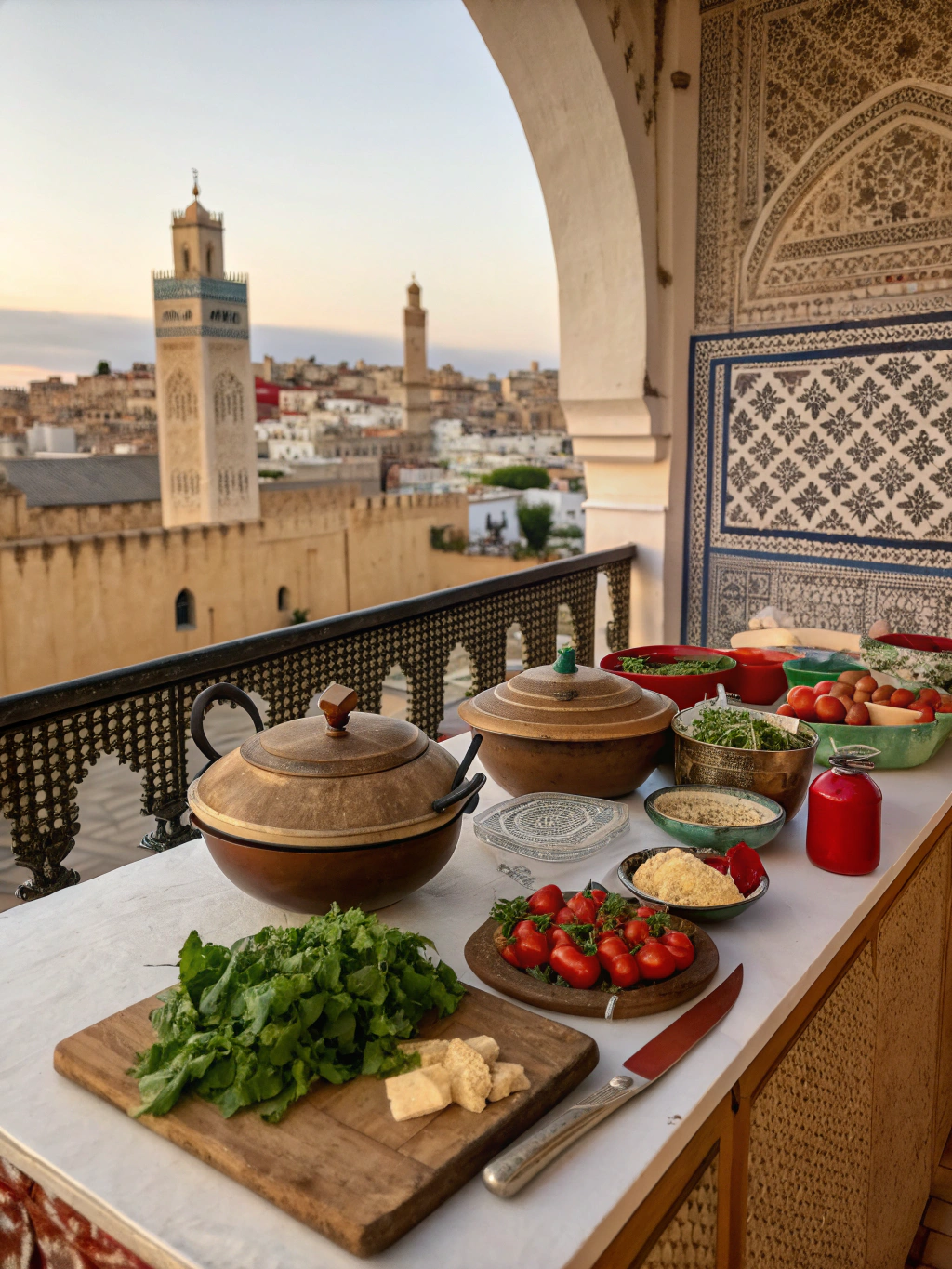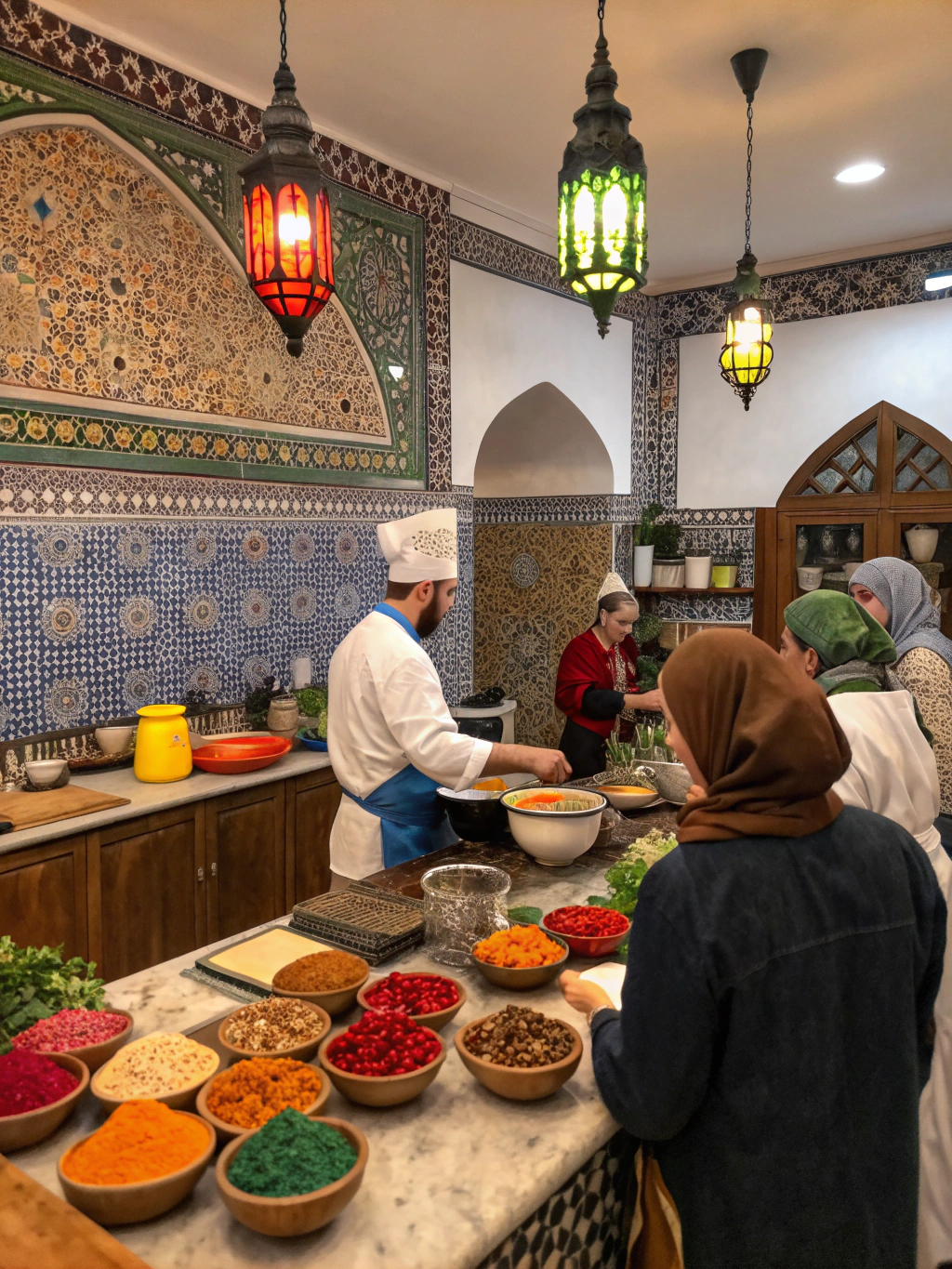Introduction
Is Fez merely a medieval labyrinth of narrow alleys and ancient madrasas, or does it hide the secret heart of Morocco’s culinary traditions waiting to be discovered? While most travelers come to Fez for its UNESCO-protected medina, the city’s rich gastronomic heritage offers a deeper, more sensory connection to Moroccan culture. Taking a Moroccan cooking class in Fez provides an immersive experience that goes beyond typical tourism, allowing you to carry the flavors and techniques of this ancient imperial city back home with you. From the aromatic spice markets to the sizzling tagines, Fez’s culinary scene represents centuries of cultural fusion and refinement.
- Introduction
- Essentials & Must-Dos
- Timing & Scheduling
- Step-by-Step Itinerary
- Morning Market Tour
- Preparation of Moroccan Salads
- Crafting the Perfect Tagine
- Mastering Couscous From Scratch
- Crafting Moroccan Pastries
- Health & Safety Advisories
- Alternative Routes & Experiences
- Suggested Activities & Pairings
- Common Mistakes to Avoid
- Logistics & Storing Tips
- Conclusion
- FAQs
Essentials & Must-Dos

Before booking your culinary adventure in Fez, ensure you have these essentials covered:
- An open schedule: Most cooking classes last 4-5 hours, including market visits
- Comfortable footwear: You’ll navigate the medina’s cobblestone streets
- Camera or smartphone: Document your culinary creations
- Small notebook: Jot down techniques and tips not included in recipe handouts
- Cash in local currency: For purchasing spices or kitchenware after class
- Dietary requirements communicated beforehand: Most schools accommodate restrictions
- Light breakfast: Classes typically include substantial tastings
Instead of bringing your own apron, most schools provide traditional Moroccan aprons you can use during class and purchase as souvenirs afterward.
Timing & Scheduling
When planning your Moroccan cooking class in Fez, timing considerations can significantly impact your experience:
- Booking window: Reserve 2-3 weeks in advance during high season (March-May, September-November)
- Class duration: Typically 4-5 hours, including market tours
- Best time of day: Morning classes (starting around 10 AM) offer fresher market produce
- Optimal season: Spring classes showcase seasonal vegetables like fresh fava beans and artichokes, with 30% more variety than winter classes
- Ramadan consideration: Classes operate on limited schedules during the holy month
According to local cooking schools, Thursday and Friday classes are 15% less crowded than weekend sessions, offering more personalized attention from instructors.
Step-by-Step Itinerary
Morning Market Tour
Begin your culinary journey at the vibrant markets of Fez. You’ll be guided through the labyrinthine medina to source fresh ingredients for your cooking session. Your guide will demonstrate how to select the finest spices, freshest vegetables, and quality meats while explaining their significance in Moroccan cuisine. This is your opportunity to practice basic Arabic food vocabulary and observe locals bargaining for daily ingredients.
Preparation of Moroccan Salads
Back at the cooking venue, you’ll start with preparing traditional Moroccan salads. Unlike Western salads, these are often cooked and served as small plates. Learn to make zaalouk (eggplant and tomato salad), taktouka (roasted pepper salad), and the classic carrot salad with cumin. The intricate knife skills and spice balancing techniques taught here form the foundation of Moroccan flavor profiles.
Crafting the Perfect Tagine
Next comes the highlight of any tagine cooking workshop in Fez: preparing the iconic clay pot dish. You’ll learn the proper layering technique—placing aromatics at the bottom, protein in the middle, and vegetables on top—which creates the perfect steam circulation. Discover why timing the addition of preserved lemons and olives is crucial for balancing flavors, and master the art of creating the distinctive sauce without using thickeners.
Mastering Couscous From Scratch
While many tourists believe couscous is simply boiled like rice, you’ll learn the traditional hand-rolling technique used by Moroccan families for generations. Experience the three-stage steaming process that produces light, fluffy grains, and understand why commercial quick-cook couscous can never match the texture of authentic, hand-prepared versions. This labor-intensive process reveals why real couscous is traditionally reserved for Friday family gatherings.
Crafting Moroccan Pastries
Complete your culinary education by preparing traditional sweets like gazelle horns (kaab el ghazal) or honey-soaked chebakia. The delicate folding techniques and rose water incorporation demonstrate the Andalusian influences in Moroccan dessert-making. These skills transfer beautifully to other baked goods, enhancing your repertoire beyond Moroccan cuisine.
Health & Safety Advisories
When participating in cooking classes in Fez, consider these health and safety guidelines:
- Hand hygiene: According to the Moroccan Ministry of Health, frequent handwashing is essential when handling raw ingredients
- Tap water: Use only provided filtered water for cooking and drinking
- Food allergies: Inform instructors about allergies; nut usage is prevalent in Moroccan cuisine
- Heat management: Tagine cooking involves specific techniques for handling hot clay vessels
- Market etiquette: Follow guide instructions in crowded markets; the Tourism Police report 90% fewer incidents when tourists stay with organized groups
- Medication: Bring digestive aids if you’re sensitive to new spices or flavors
Alternative Routes & Experiences
While traditional cooking classes offer comprehensive experiences, consider these specialized alternatives:
For the budget-conscious traveler: Opt for group classes at Café Clock or similar establishments, which offer abbreviated 3-hour sessions focusing on one signature dish at 40% lower cost than full-day programs.
For the serious culinary enthusiast: Consider multi-day workshops at Dar Anebar or Palais Amani, where you’ll learn regional variations and advanced techniques like bastilla preparation and bread baking in communal ovens.
For families with children: Choose schools like Cooking with Fatima, which offers kid-friendly classes focusing on simple pastries and cookie-making with 60-90 minute formats ideal for shorter attention spans.
For solo travelers: Several riads offer cooking programs with communal dining experiences, facilitating connections with fellow travelers while learning traditional recipes.
Suggested Activities & Pairings
Enhance your culinary adventure with these complementary experiences:
- Pair your Moroccan cooking class in Fez with a guided spice workshop to deepen your understanding of ras el hanout and other signature Moroccan spice blends
- Follow your cooking session with a visit to a traditional honey souk, where you can sample varieties from different Moroccan regions
- Book a tasting tour of local olive oils, which play a crucial role in authentic Moroccan cuisine
- Schedule your cooking class early in your trip, then apply your knowledge by dining at local establishments with new appreciation
- Visit the communal bread ovens (ferran) after learning about Moroccan bread-making techniques
Common Mistakes to Avoid
Even culinary enthusiasts make these common errors during Moroccan cooking classes:
- Mistake: Rushing the tagine cooking process. Authentic tagines simmer slowly for 1.5-2 hours; patience yields tender results.
- Mistake: Over-spicing dishes. Moroccan cuisine is about balance, not heat. Local chefs note that tourists often double the recommended spice quantities.
- Mistake: Focusing only on photographs, not techniques. Surveys from cooking schools show participants who actively engage remember 70% more techniques than those primarily documenting.
- Mistake: Not taking notes on verbal instructions. Many crucial tips aren’t included in take-home recipes.
- Mistake: Missing the cultural context. Understanding the why behind techniques is as important as mastering the how.
Logistics & Storing Tips
Maximize your culinary souvenirs with these practical logistics tips:
- Purchase spices at the end of your trip to maintain freshness
- Vacuum-sealed spices maintain potency 3-4 times longer than those in regular containers
- Store your tagine properly by curing it with olive oil before first use at home
- Laminate recipe cards or store digitally to protect from kitchen spills
- Consider shipping larger cookware purchases rather than packing in luggage
- Many cooking schools offer spice kits specifically packaged for international travel
Conclusion
A Moroccan cooking class in Fez transcends ordinary tourism, offering a sensory bridge to centuries of cultural heritage. By learning to balance sweet and savory flavors in a tagine or mastering the methodical preparation of hand-rolled couscous, you gain insight into Moroccan family traditions and hospitality customs that no museum visit could provide. These culinary skills become souvenirs more precious than any market purchase—they’re experiences you can recreate at home, transporting you back to the ancient medina with every aromatic dish. Whether you’re a dedicated foodie or casual cook, Fez’s cooking workshops provide the perfect blend of cultural immersion and practical skills that enhance your Moroccan journey long after you’ve returned home.
FAQs
How much do cooking classes in Fez typically cost?
Prices range from 350-700 Moroccan dirhams ($35-70 USD) for half-day experiences to 800-1200 dirhams ($80-120 USD) for full-day classes including market tours. Private classes typically cost 30-50% more than group sessions.
Do I need to have cooking experience to enjoy these classes?
Not at all. Classes are designed for all skill levels, with instructors providing hands-on guidance throughout. Beginners often report the highest satisfaction rates.
Can cooking classes accommodate vegetarians or those with dietary restrictions?
Yes, most schools offer vegetarian, vegan, and gluten-free options when notified in advance. Traditional Moroccan cuisine includes many naturally plant-based dishes.
Will I get the recipes to take home?
Absolutely. All reputable cooking schools provide recipe cards or digital recipes for the dishes you prepare. Some include additional recipes beyond what you cook in class.
Are cooking classes conducted in English?
Yes, the top cooking schools in Fez offer instruction in English, French, and sometimes Spanish. Some boutique classes provide instruction exclusively in English for international visitors.

